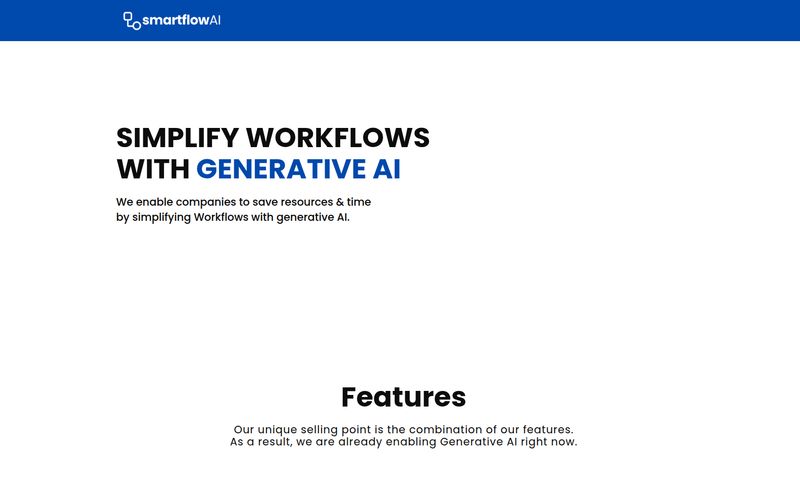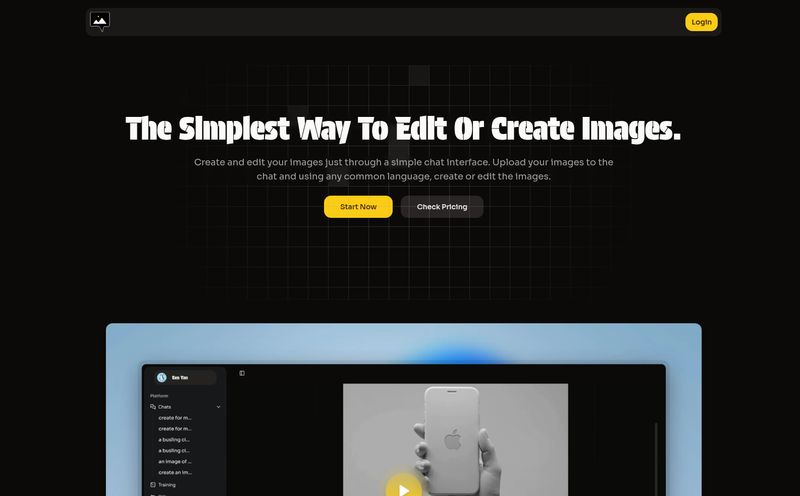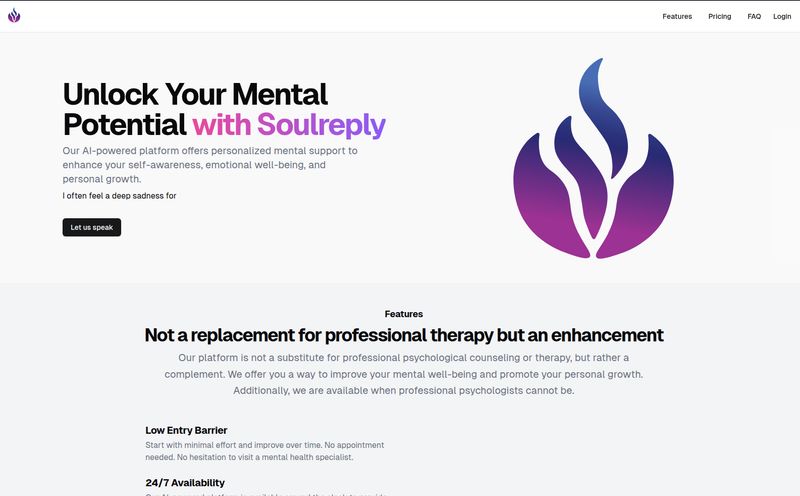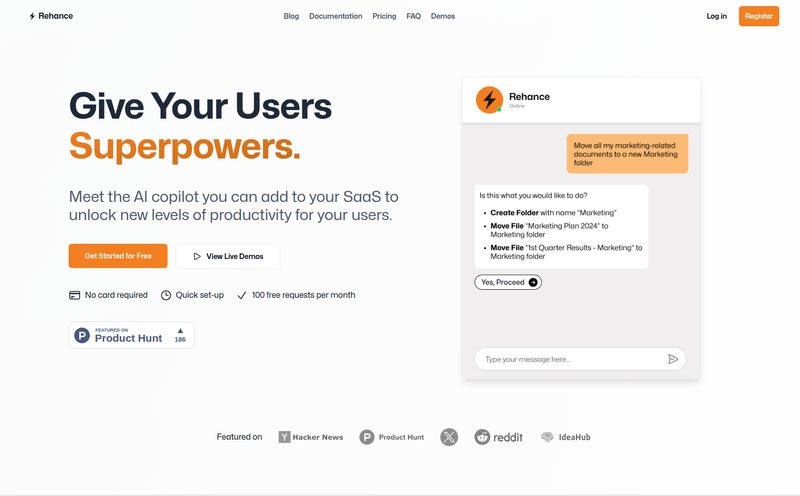In my years of swimming in the digital marketing and SEO soup, I've seen tools come and go faster than you can say “algorithm update.” It’s a wild west out here. One day you’re raving about a game-changing new platform, and the next, its digital tumbleweeds. And that, my friends, brings me to the curious story of Wetune.
I first heard about Wetune a little while back. The pitch was pure gold for people like us: a no-code tool to spin up your own little AI applications, all powered by the big brain at OpenAI. Imagine creating a bespoke AI assistant to generate your blog post outlines, another to craft witty social media replies, or even one to write you a sad country song about your PPC campaign's low CTR. The possibilities felt… well, pretty awesome. It promised to be the ultimate tinkerer's sandbox.
But then, something weird happened. I went to check back in on it, and I hit a wall. A very expensive, GoDaddy-branded wall. More on that in a minute.
">
So, What Was Wetune Supposed to Be?
At its heart, Wetune was designed to democratize AI. You didn't need to be a Python wizard or have a PhD in machine learning to get in on the action. The idea was simple: you give the platform some prompts and instructions, and it would wrap them up into a neat, shareable AI application. Think of it like building with AI Legos. You’re not manufacturing the plastic bricks (that's OpenAI's job), but you get to decide whether you’re building a spaceship or a castle.
It was aimed at everyone from marketers looking to streamline content creation to developers who wanted to prototype an idea without writing a single line of code. You could build tools for poetry, stories, code snippets, lyrics... pretty much any text-based output you could dream of. For a moment, it felt like we were all getting our own personal AI genie in a bottle.
The Experience and The Features That Were
The Simplicity of No-Code
The biggest draw was, without a doubt, the no-code aspect. I've had countless clients whose eyes glaze over the second you mention API integration. A tool like Wetune was the perfect answer. It lowered the barrier to entry so low you could trip over it. This approach is powerful because it puts creation directly into the hands of the creatives, the marketers, and the strategists—the people who actually have the day-to-day problems that AI can solve.
Built on a Solid Foundation
Let's be real, an AI tool is only as good as the model powering it. Wetune made a smart move by building on OpenAI's GPT technology. We all know how capable it is. This meant that the output, whether it was a piece of code or a short story, had a baseline of quality that was genuinely impressive. It wasn't some clunky, homegrown model spitting out gibberish; it was the real deal.
The Good, The Bad… and The Missing
Every tool has its quirks, right? Wetune was a classic startup story, full of promise and a few… let's call them 'works in progress'. It was fast, it was easy, and best of all, it was free to use (for a time). That's the trifecta that gets any digital marketer’s attention.
But there were signs of growing pains. A "branching" feature, which sounds like it would have allowed for more complex, conditional logic in your AI apps, was apparently removed with a promise to be added back later. The templates, which would have been a fantastic starting point for newbies, were perpetually listed as "coming soon." Its a classic story of ambition slightly out-pacing execution.
">
The Elephant in the Room: Where Did Wetune.chat Go?
So, I was getting ready to really put this tool through its paces. I navigated to the domain, Wetune.chat, and was greeted not by a slick, futuristic AI interface, but by a GoDaddy landing page. And it wasn't just a simple error. Oh no. The situation was much more… final.
The entire domain is for sale. For a cool $2,200.
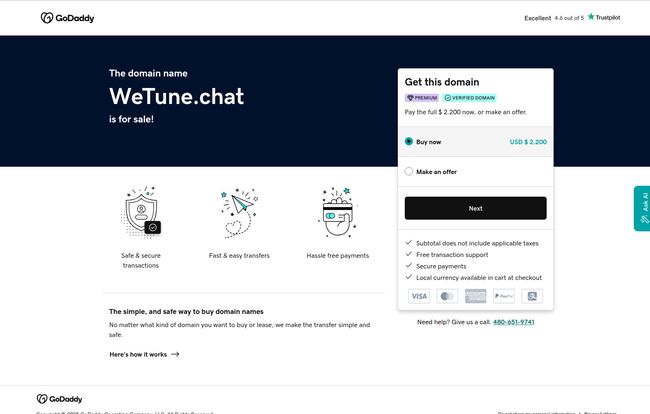
Visit Wetune
This is the digital equivalent of showing up to your favorite coffee shop to find it boarded up with a “For Lease” sign in the window. What happened? Did the founders run out of money to pay for the OpenAI API calls, which are definitely not free at scale? Did they get a better offer and pivot? Or did they simply lose the passion and forget to renew their domain?
We might never know the full story, but it serves as a powerful lesson. This is the volatile reality of the current AI gold rush. For every stable, well-funded platform, there are a dozen brilliant ideas that flicker out just as quickly as they appeared. It's the digital graveyard of promising startups, and it seems Wetune has its own plot.
A Cautionary Tale for The No-Code Movement
The fall of Wetune, or whatever we want to call this vanishing act, isn't just about one tool. It's a commentary on the ecosystem. As users, we have to be smart. It's exciting to jump on a new, free tool, but it's risky to build your entire workflow around it without knowing if it'll be there next month. Always have a plan B. My advice? Look for signs of life: an active blog, a recent social media post, a clear pricing page. These are signs that someone is home and the lights are on.
">
What About the Price?
Wetune was free, but the plan was always to introduce pricing later. This is a common strategy to build a user base. However, it highlights the core challenge: balancing the high operational costs of running AI models with finding a price point that customers are willing to pay. Free is a great marketing tool, but it's not a sustainable business model, as the empty storefront at Wetune.chat now proves.
Frequently Asked Questions About Wetune
What exactly was Wetune?
Wetune was a no-code platform that allowed users to create and share their own small, specialized AI applications. It used OpenAI's GPT technology to generate various types of text-based content, from code to poetry, based on user-defined prompts.
Why can't I access the Wetune.chat website?
As of late, the domain name `wetune.chat` is listed for sale on GoDaddy for $2,200. This indicates the original owners did not renew the domain, and the platform is no longer operational at that address.
Was Wetune free to use?
Yes, during its operational period, Wetune was free to use. However, the company had indicated that they might introduce a pricing model in the future, which is a common practice for new SaaS tools.
What are some good alternatives to Wetune?
If you're looking for no-code or low-code AI integration, you have options! For workflow automation with AI, check out platforms like Zapier or Make. For building more complex custom applications without code, platforms like Bubble are incredibly powerful and have plugins to connect to AI models.
Is it risky to build processes around new, free AI tools?
Yes, there is an inherent risk. As the story of Wetune shows, new startups can disappear without warning. It's fine for experimentation and non-critical tasks, but for core business processes, it's safer to rely on more established platforms with transparent business models.
A Final Thought on Digital Ghosts
So, R.I.P. Wetune. You were a brilliant flash in the pan, a great idea that, for whatever reason, didn't make it. Your story is a valuable one for all of us in the tech space. It reminds us to be cautiously optimistic, to enjoy the innovation, but to never forget the volatile, ever-shifting ground beneath our feet. Now, if you'll excuse me, I'm going to go check if all my favorite tools have renewed their domains.
Reference and Sources
- GoDaddy Domain Listing for Wetune.chat (Note: This link may become inactive if the domain is sold)
- TechCrunch: The Rise of 'No Code'
- Bubble.io (No-Code App Builder Alternative)
- Zapier (Automation Platform Alternative)
